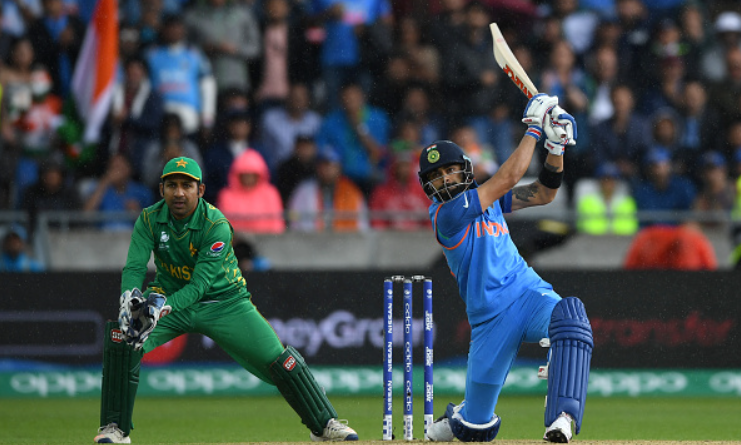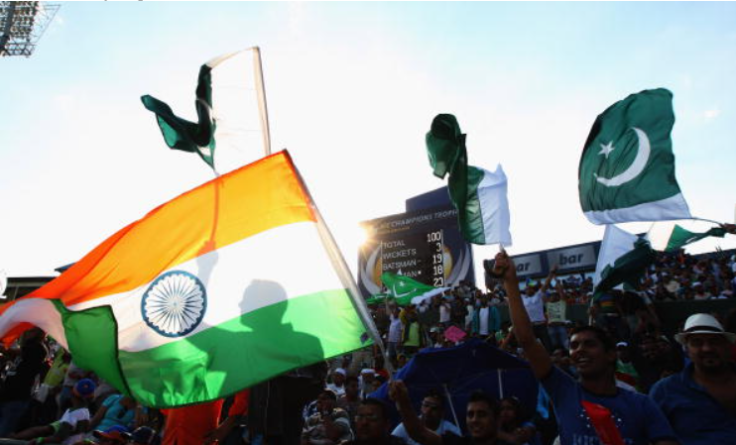
When my generation of cricket fans—growing up after the turn of the century—look back on the India-Pakistan cricketing rivalry, there is almost nothing to go by: just one bilateral series in thirteen years and a handful of tournament games. Despite the ongoing tensions and trust-deficit in the bilateral relationship, three developments have improved the viability of resuming India-Pakistan cricket.
First, the new Test Championship and Super League offer long-term mechanisms that help insulate cricket from external shocks that have periodically halted ongoing peace initiatives. Second, both countries are currently upholding one of the most notable Confidence-Building Measures (CBMs) in recent years—not in the cricket ground, but on the Line of Control (LoC) in Kashmir through the February 2021 ceasefire. Third, Ramiz Raja’s recent appointment as Chairman of the Pakistan Cricket Board (PCB) improves the potential for normalization given his prior record of supporting Indo-Pak cricket.
Pakistan wants to resume cricket with India because it will have significant commercial value for the PCB, which, in the words of Ramiz Raja, has struggled to develop a robust “cricket economy.” Conversely, the Board of Control for Cricket in India (BCCI) receives the lion’s share of International Cricket Council (ICC) revenues along with substantial income from the Indian Premier League (IPL). Yet, the most salient condition to restarting cricket is not financial. It is political. With cricket ties between India and Pakistan all but suspended following the 2008 Mumbai terrorist attacks, the sport has become increasingly entrenched in the political relationship. Indian leaders fear being seen as “weak” on terrorism or Pakistan, which substantially diminishes political will in India to resume cricket. However, while cricket currently fuels division, its role as a unique and lasting bond between Pakistanis and Indians also makes it a powerful tool for people-to-people engagement in civil society.
Strangers on the Field
While India-Pakistan cricket has a turbulent history, the most recent stall in India-Pakistan cricket started in 2008, following the Mumbai terrorist attacks carried out by the Pakistan-based, anti-India militant group Lashkar-e-Taiba, which occurred between the first two IPL iterations. In the inaugural edition of the IPL months before the attack, Pakistani bowler Sohail Tanvir was the highest wicket-taker. However, no team bid for him in next year’s auction—or, for that matter, any of the other 11 Pakistani players. Team owners said they did not know whether the Indian government would grant visas to Pakistani cricketers.
Unlike politics, sports enable people to channel emotional impulses through victory and defeat, which may help explain why some select Indo-Pak cricket games have helped India and Pakistan move closer diplomatically in tense geopolitical environments.
India then canceled a tour of Pakistan in 2009, making it clear that isolation had moved past diplomacy and entered the cricket field. Since then, India has principally refused to play Pakistan, saying that terror and cricket cannot go together—unless in international tournaments, of course, when points matter more than principles.
Pakistan has expressed willingness to resume cricket with India. A moment of hope arose when the PCB and BCCI signed a MOU to resume bilateral cricket in 2014. However, the Indian government refused to grant permission to play against Pakistan and the thaw cricket fans hoped for never materialized. In the past decade, India has indicated little political will to bifurcate cricket and politics, which follows a broader isolationist stance towards Pakistan. The interweaving of Pakistan, cricket, and terror has not only stood the test of time but has become deeply ingrained rhetoric–resurfacing repeatedly in mainstream and social media—and especially within cricketing circles.
After the Pulwama attack in 2019, current and retired Indian cricketers—including Harbhajan Singh, Gautum Gambhir, and Yuzvendra Chahal—urged the government to boycott India’s upcoming World Cup match against Pakistan (although legendary players Sachin Tendulkar and Sunil Gavaskar, who played Pakistan extensively in past decades, did not support the boycott). The game went ahead, and India won. Afterwards, BJP Home Affairs Minister Amit Shah termed India’s victory as “another strike on Pakistan.” One expects such jingoism from nationalist politicians, but cricketers publicly advocating for a boycott—through compulsion or sentiment—demonstrates the extent to which the government’s nationalist posturing has permeated India’s cricketing world.
No India-Pakistan cricket game has ever been entirely insulated from politics and nationalism. Chest-thumping sloganeering and nationalist vitriol from both countries enters discourse on and off the field. However, unlike politics, sports enable people to channel emotional impulses through victory and defeat, which may help explain why some select Indo-Pak cricket games have helped India and Pakistan move closer diplomatically in tense geopolitical environments. Through phased timelines, subnational trust-based initiatives, and cricketing CBMs, Pakistan and India can once again normalize cricketing relations.

Towards Cricket CBMs
While both countries have periodically implemented CBMs, external shocks have ended many initiatives dead in their tracks. Cricket offers a potential reprieve. The ICC recently launched two recurring tournaments: The Test Championship and the World Cup Super League. The new initiatives aggregate all bilateral series within a three-year window through a tournament structure that attaches points to every match.
The next tournament iterations begin in 2023. Should Pakistan and India resume cricket by then, the tournaments provide a structure for sustained Indo-Pak cricket for years to come. Playing matches through these tournaments—as opposed to easily cancelable bilateral matches—will help insulate cricket-related CBMs from turbulent ebbs and flows inherent in their relationship. Cancelling matches hinder tournament success as teams forfeit vital points.
In the interim, Pakistan and India can focus on low-hanging fruit. Governments may consider overturning local television bans on airing the IPL and the Pakistan Super League (PSL). The ICC could also invite Pakistani commentators to cover Indian matches and vice versa, and even expand cross-border commentary to the IPL and PSL. As a beloved sport in both countries, it is important not to overlook the range of possible engagement opportunities. In 2017, India issued visas for the Pakistan blind cricket team. And, while much of the focus remains on the men’s national teams (this essay included), organizing an initial women’s series should also be considered given the growing popularity of the women’s game.
Playing matches through these tournaments–as opposed to easily cancelable bilateral matches–will help insultate cricket-related CBMs from turbulent ebbs and flows inherent in the [India and Pakistan] relationship.
Subnational trust-building initiatives could also help expedite the path to normalization. The February 2021 ceasefire is the most successful CBM that both countries are currently engaged in. Can cricket along the LoC play a role in normalization? Perhaps. Even staunch optimists may struggle to picture Indian and Pakistani soldiers laying down their weapons and playing cricket along the LoC in Kashmir. But in the non-hostile environment of the joint-military exercises organized by the Shanghai Cooperation Organization in 2018, Pakistani and Indian soldiers were seen dancing to Bollywood music together. Ceasefire or not, the LoC remains far more hostile than friendly military exercises in Russia. But despite the difficulties, well-planned, well-coordinated, informal evening cricket between jawans at the LoC would a powerful symbol and potentially catalyze a broader process towards normalizing cricket ties.
Should India demonstrate political will to resume cricket, they have workable cricketing partners across the border. Prime Minister Imran Khan is Pakistan’s most famous cricketer, and PCB Chairman Ramiz Raja has been an international commentator for almost twenty years (including at the IPL until 2017). Purely from a cricketing perspective, both have received much adulation from Indians throughout their cricketing lives.
Imran Khan and Ramiz Raja toured India together, played in front of Indian crowds, and regularly appeared on Indian media. Both have previously advocated for resuming cricket. Ramiz Raja negotiated a breakthrough India-Pakistan series in 2004-5, earning him and the series the Laureus Award for bringing the countries together. Their unique exposure to India’s cricketing fandom—and conversely, Indian cricket’s exposure to them—may help neutralize hardline voices that will inevitably come to the fore should cricket resume.
If There Was Ever a Time for Normalization, it is Now
There are significant limitations on the power of individuals in international relations, especially in South Asia. Structural fault lines, geopolitical shocks, and institutional legacies prevent the most well-intentioned statesmen from working towards sustainable peace. At the same time, it is also true that there has never been a period when the two people in charge of Pakistan’s long-term cricketing strategy are its greatest-ever cricket player and most famous cricketing voice. This fact is not lost on cricket fans. One hopes it isn’t lost on governments, too.
The last time India and Pakistan played a test match in Chennai was nearly twenty-three years ago, months before I was born. In that match, Pakistan edged India to a slender win. Indian supporters stood up and applauded as Pakistani players ran a victory lap. From the commentator’s box, Harsha Bhogle lamented: “I’ve never seen a stronger statement for sport than this.” That message still reverberates today. The time is ripe for our governments to pay heed to it.
***
Click here to read this article in Urdu.
Image 1: Gareth Copley via Getty Images
Image 2: Tom Shaw via Getty Images


